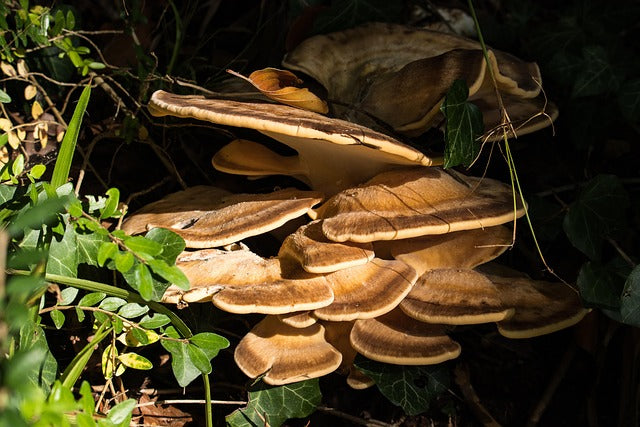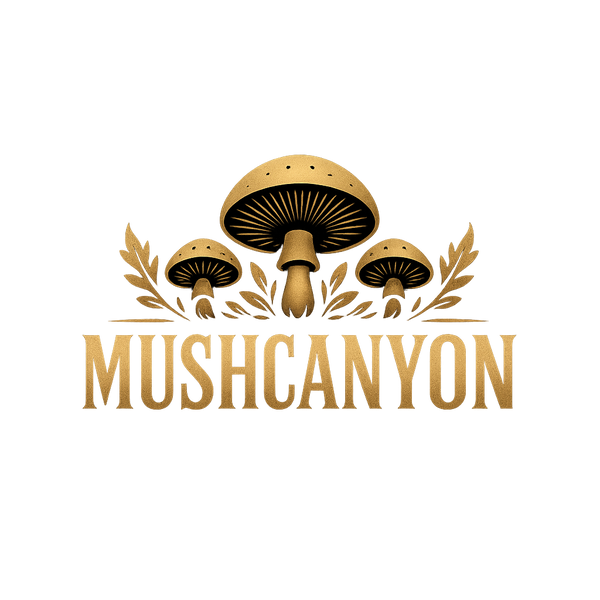
The Science-Backed Benefits of Turkey Tail Mushroom
Share
Turkey Tail mushroom (Trametes versicolor), named for its colorful, fan-shaped appearance resembling a turkey’s tail, has been used in traditional medicine for centuries. Today, modern science is catching up, with research highlighting its impressive range of health-promoting properties. From supporting immunity to aiding gut health, Turkey Tail is becoming one of the most studied medicinal mushrooms in the world.
1. Immune System Support
One of the most well-documented benefits of Turkey Tail mushroom is its ability to strengthen the immune system. It contains unique polysaccharopeptides, such as polysaccharide-K (PSK) and polysaccharopeptide (PSP). These compounds help regulate and activate immune cells, including natural killer cells and T-cells, which are essential for fighting infections and abnormal cell growth.
In fact, PSK is so well-researched that it has been approved as an adjunct cancer therapy in Japan for decades. Clinical trials have shown that PSK can improve survival rates and enhance the effectiveness of chemotherapy by stimulating immune defenses.
2. Potential Anti-Cancer Properties
Beyond general immune support, Turkey Tail mushroom has gained attention for its potential role in cancer care. Studies suggest that PSK and PSP may inhibit tumor growth and improve survival outcomes in patients with cancers of the stomach, lung, breast, and colon.
While Turkey Tail is not a cure, its use alongside conventional treatments has shown promise in reducing side effects, boosting resilience, and improving quality of life for patients. Scientists believe its immune-modulating effects help the body better recognize and fight abnormal cells.
3. Gut Health and Prebiotic Effects
Another exciting area of research is Turkey Tail’s impact on gut health. The mushroom contains prebiotic fibers that feed beneficial gut bacteria, such as Bifidobacterium and Lactobacillus.
A balanced gut microbiome is critical for overall health, influencing digestion, mood, metabolism, and immunity. Studies have found that supplementing with Turkey Tail can increase populations of good bacteria while suppressing harmful ones, such as Clostridium difficile, which is known to cause digestive illness.
By supporting a healthy gut, Turkey Tail indirectly enhances immune function, since a large portion of the immune system resides in the digestive tract.
4. Rich in Antioxidants
Turkey Tail mushrooms are also loaded with powerful antioxidants, including flavonoids and phenols. Antioxidants protect the body against oxidative stress, which can damage cells and accelerate aging. They also help lower inflammation, which is linked to chronic conditions such as heart disease and diabetes.
By reducing oxidative stress, Turkey Tail may contribute to better energy levels, improved skin health, and overall vitality.
5. Antiviral and Antimicrobial Properties
Laboratory studies suggest Turkey Tail may help the body fight off certain viral and bacterial infections. Research has shown it may inhibit the replication of some viruses and bolster the immune response against common infections. While more human studies are needed, this adds to its reputation as a broad-spectrum immune booster.
6. Support for Energy and Recovery
Traditional use and modern anecdotes both point to Turkey Tail’s role in improving stamina and recovery. By supporting immunity and reducing inflammation, it may help the body recover more quickly after illness or intense physical activity. This makes it a valuable supplement not only for those managing chronic conditions but also for athletes and anyone seeking improved resilience.
Conclusion
Turkey Tail mushroom is more than a colorful fungus growing on fallen trees—it’s a natural powerhouse backed by modern science. Its immune-boosting polysaccharides, gut-friendly prebiotics, and potent antioxidants make it one of the most versatile medicinal mushrooms available today.
Whether you are looking to support long-term health, complement medical treatments, or simply improve your overall wellness, Turkey Tail is a natural ally worth considering. As always, consult with a healthcare provider before starting any supplement, especially if you are undergoing medical treatment.
Consider Adding MushCanyon Mushroom Complex 10X to Your Routine
If you're looking for a comprehensive mushroom supplement that aligns well with the benefits of Turkey Tail while expanding your wellness arsenal, MushCanyon Mushroom Complex 10X is an excellent all-in-one option.
What It Is
A potent blend of 10 medicinal mushrooms, this supplement features well-known and research-backed species like Turkey Tail, Reishi, Lion’s Mane, Cordyceps, Chaga, Maitake, and others.
The Benefits at a Glance
|
Feature |
Benefit |
|
Immune Support |
Turkey Tail, Reishi, Chaga, and Maitake provide beta-glucans and polysaccharides that support immune cell activity. |
|
Mental Clarity & Focus |
Lion’s Mane supports cognitive clarity and nerve regeneration. |
|
Safe Energy & Endurance |
Cordyceps enhances stamina and oxygen use. |
|
Antioxidant & Anti-Inflammatory Aid |
Chaga and Turkey Tail contribute powerful antioxidants and help protect against oxidative stress. |
|
Holistic Wellness |
Formulated to support stress resilience, digestion, sleep cycles, and healthy aging. |
Scientific References for Turkey Tail Mushroom Benefits
- Immune Support & Cancer Research
- Kidd, P. M. (2000). The use of mushroom glucans and proteoglycans in cancer treatment. Alternative Medicine Review, 5(1), 4–27.
- Oba, K., Kobayashi, M., Matsui, T., Kodera, Y., Sakamoto, J. (2007). Individual patient based meta-analysis of PSK in randomized controlled trials of gastric cancer. Anticancer Research, 27(1B), 4381–4388.
- Standish, L. J., Wenner, C. A., Sweet, E. S., et al. (2008). PSK immunomodulation in patients with breast cancer. Integrative Cancer Therapies, 7(3), 193–200.
- Gut Health & Prebiotic Effects
- Vetvicka, V., Vannucci, L., Sima, P., Richter, J. (2019). Beta glucan: Supplement or drug? From laboratory to clinical trials. Molecules, 24(7), 1251.
- Cui, J., Chisti, Y. (2003). Polysaccharopeptides of Coriolus versicolor: Physiological activity, uses, and production. Biotechnology Advances, 21(2), 109–122.
- Antioxidant & Anti-Inflammatory Properties
- Wasser, S. P. (2017). Medicinal mushrooms in human clinical studies: Part I – anticancer, oncoimmunological, and immunomodulatory activities. International Journal of Medicinal Mushrooms, 19(4), 279–317.
- Li, X., He, Y., Zeng, P., et al. (2018). Molecular basis for Coriolus versicolor polysaccharopeptide’s anticancer activities. Frontiers in Pharmacology, 9, 595.
- Antimicrobial & Antiviral Potential
- Fisher, M., Yang, L. X. (2002). Anticancer effects and mechanisms of polysaccharide-K (PSK): Implications of cancer immunotherapy. Anticancer Research, 22(3), 1737–1754.
- Ooi, V. E. C., Liu, F. (2000). Immunomodulation and anticancer activity of polysaccharide-protein complexes. Current Medicinal Chemistry, 7(7), 715–729.
